Researchers connect for ACT Symposium, advancing science on dementia, aging
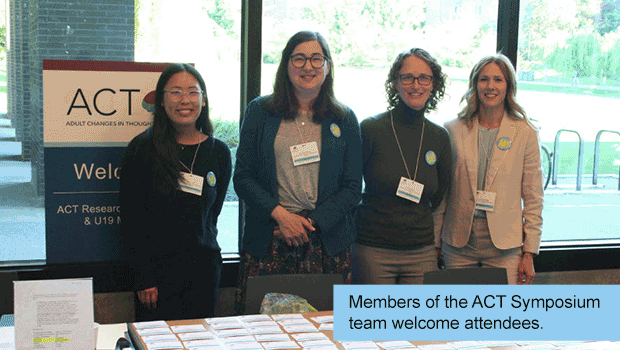
The long-running ACT Study is now in its 30th year
The 11th Adult Changes in Thought (ACT) Study research symposium took place in May over 2 days on the University of Washington campus. More than 120 attendees met to discuss research on aging and cognition and build relationships and ideas for future projects.
The ACT Study, which began in 1994, follows a volunteer cohort of thousands of Kaiser Permanente Washington members as they age. The resulting long-term data are rich and unique, and have allowed researchers to identify many factors that impact brain aging. The goal of the study is to develop better ways to protect cognitive health in aging and reduce risk of Alzheimer’s disease and other causes of dementia.
Linda McEvoy, PhD, at Kaiser Permanente Washington Health Research Institute (KPWHRI), co-leads the study along with Paul Crane, MD, MPH, at the University of Washington, and Andrea LaCroix, PhD, at University of California San Diego.
“As the longest-running study of its kind, ACT is a very special thing to be a part of,” said McEvoy in her opening remarks for this year’s symposium. “We now have a large group of collaborators across the U.S. and internationally, and it’s wonderful to have this opportunity to connect in person and hear about all the work that’s happening to move us closer to a common goal of preventing dementia.”
The theme of this year’s symposium was “Alzheimer’s Disease and Dementia Biomarkers: Current Advances, Future Directions, Implications for Research.” During the keynote presentation (watch video), Michelle Mielke, PhD, of Wake Forest University School of Medicine, gave an overview of the current status of blood-based biomarkers for Alzheimer’s disease. Measuring certain proteins that accumulate in the brain of someone with Alzheimer’s is one of the best ways to diagnose the disease, but existing diagnostic tests are invasive and costly. Mielke discussed the promise of blood testing for making diagnosis more accessible and straightforward, while addressing some obstacles that need to be overcome before these tests are ready to be used more widely.
After the keynote, attendees heard a wide range of presentations on research that uses ACT data or that addresses issues of importance to older adults, such as lowering the risk of falls by reducing use of certain medications (the STOP FALLS study). ACT investigators discussed their research examining whether adverse pregnancy outcomes (such as preterm birth) are associated with cognitive decline later in life and on leveraging natural language processing to gather information from medical notes about the lived experience of older adults. They also shared plans for a study on links between airborne metals and neurodegeneration.
McEvoy gave an update on the ACT Clinical Core, which supports data collection activities for the ACT Study and ancillary studies. From 2020 to 2022, enrollment in the ACT cohort dropped significantly because the study was not able to recruit new participants during the COVID-19 pandemic. But over just the past year, enrollment has risen nearly to the same level as before the COVID-19 pandemic began, and the study team is optimistic that they can reach a goal of 3,000 total participants in the coming years. This is part of the expansion of the ACT Study that was funded by the National Institutes of Health in 2021, and includes new strategies to not only grow the cohort but also increase diversity among the participants.
A talk by Kacie Deters, PhD, of the University of California, Los Angeles, emphasized the importance of this work to enable diverse participation in aging studies. Deters spoke about the ethnic and racial disparities in predictors of cognitive decline (watch video). Her talk highlighted how making research more inclusive can help us learn about a broader range of risk factors for dementia and ensure that diagnosis and treatment approaches for dementia are not excluding certain racialized groups.
A strength of ACT, and a highlight of the symposium, has always been the wide range of topics and studies that the data make possible. Other presentation topics included:
- Molecular drivers of resilience to Alzheimer’s disease
- An atlas of microglia, which are types of brain cells that play a crucial role in responding to diseases like dementia
- Advanced diffusion MRI modeling to better understand white matter lesions in the brain
- Dementia biomarkers in blood plasma and cerebrospinal fluid
- MRI methods to study changes in blood vessels associated with aging and cognitive impairment
The symposium included a tribute to Laura Gibbons, PhD, a biostatistician and longtime ACT researcher who is moving on from her role after many years. Colleagues and collaborators shared stories of her mentorship, kindness, and deep knowledge of and dedication to ACT. They also spoke about her dedication to scientific rigor and her unique ability to explain complicated ideas.
During the symposium, there were special sessions with time set aside for early-career researchers to meet and connect, and for ACT Study participants to talk with investigators about their research and projects.
In closing the symposium, Andrea LaCroix spoke about key takeaways. She highlighted the wonderful progress that ACT has made possible, while also emphasizing how much there is still to learn. The ACT Study is uniquely positioned to enable further advances, she said, and the presentations made clear that its contributions to the field will continue.
To watch recordings of other talks at this year's symposium and view speaker slides, please visit the ACT Study website. You can also read more on the KPWHRI website about the institute’s entire aging research portfolio.
By Amelia Apfel
Learn About the ACT Study
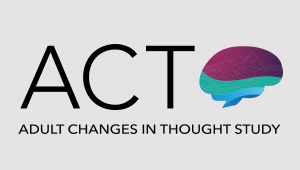
Understanding brain aging
For over 30 years, the Adult Changes in Thought (ACT) Study has been advancing our understanding of cognition, aging, and better ways to delay and prevent Alzheimer’s disease and related dementias.
2023 ACT Symposium
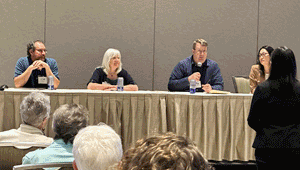
Researchers gather to address critical topics in aging and dementia
The ACT Research Symposium returns with an in-person scientific forum.
New funding
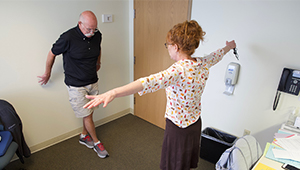
Grant of over $55M to boost Alzheimer’s, dementia study
Kaiser Permanente Washington will co-lead an expanded ACT Program to better understand the aging brain.
ACT Study news
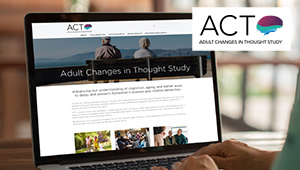
Healthy aging: New tool for research and collaboration
Adult Changes in Thought (ACT) Study launches a new website to advance our understanding of brain aging.


